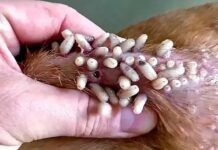Whenever we notice strange behavior in our furry companions, alarm bells go off. We love them so much that anything abnormal makes us wonder if they are feeling well or if they are sick. Dogs are animals that usually scratch quite a bit; keep in mind that they are completely covered with fur, which under certain conditions can cause excessive scratching.
Let’s review the main reasons that could cause a dog to scratch excessively, and we’ll also see the solutions and recommendations for each case. Don’t be alarmed – any pathology related to your dog’s scratching has a solution, it’s nothing to be worried about.

My dog scratches a lot – Possible reasons
The first thing to do is find the reason why your dog won’t stop scratching. There are several possible reasons, but they are very easy to identify; you just have to do an in depth inspection of your dog and you’ll quickly discover the reason for his itchiness.
- Have your dog sit or lie down, calm him down and carefully examines the area where he scratches. Look for insect bites, skin redness, etc. Anything strange you encounter will help you find the cause and implement the most appropriate solution.
The main reasons why a dog is constantly scratching are:
- Fleas, ticks and their respective bites
- Allergies
- Dermatological irritation
- Bites or stings from wasps, bees, spiders or snakes

My dog scratches a lot – Fleas and Ticks
If you notice that your dog has started scratching a lot more than usual, one of the main reasons may be that he has caught fleas or ticks. Fleas cause tremendous itching in dogs and very annoying skin irritation, which makes them scratch constantly trying to kill the fleas or relieve their itchiness.
Ticks, which sometimes find their way onto our dogs, also produce severe irritation on their skin. They use their legs and spines to cling to the skin of our furry friend and begin to suck his blood. This produces a lot of itching in dogs, who will begin scratching a lot to try to get rid of them.
Detecting fleas or ticks is very simple; all you have to do is check your dog thoroughly, spreading his fur with your hands, looking for small insects (in the case of fleas) or small “kernels” (in the case of ticks).
If you find any fleas or ticks on your dog, you’ll know the reason for his constant itching. The solution is very simple: you have to bathe your pet with an anti-parasitic shampoo (sold in veterinary clinics). When he has dried off, you’ll have to wait a day or two for his skin to regenerate its natural oils and then apply an anti-parasite pipette. Pipettes must be applied once a month, always one or two days after the bath.
You can also put on an anti-parasite collar. They aren’t very expensive and have a duration of two to three months. They are effective and can be used right after your dog’s bath without having to wait one or two days for his skin to regenerate its natural oils. But you’ll also have to use the pipette, when appropriate, to keep your dog 100% protected from parasites.
Fleas will die and fall off by themselves, and ticks will do the same; thanks to the poison in the shampoo and pipette, they’ll die and fall off by themselves. Your dog will stop scratching and you will have solved the problem.

My dog scratches a lot – Allergies
Another reason why your pet can have excessive scratching is allergies. Allergies can occur at any time in your dog’s life and can appear without warning, making them more difficult to detect.
The main allergies are a result of the products used in the manufacturing of dog food. Believe it or not, most dog foods are a real mess; they’re made with animal waste that can’t be used for human consumption. Don’t think of pieces of meat – think of organs, heads and dry bones.
Food allergies are the most common and are usually resolved by changing dog food or eliminating dog food from your dog’s diet and using natural food for dogs, such as the BARF Diet.
To speed up the detection process, you should go to a veterinary clinic and get a blood test for your dog to determine which product or products are causing the allergy. It’s not something to put on the back burner; it’s something serious that could cause many more health problems in your dog if not treated properly.
My dog scratches a lot – Dermal irritation
If your dog won’t stop scratching and after inspecting you find very red areas on his skin, or even areas where there is a rash or lack of hair, it may be that your dog has a mite infection known as scabies or mange. Don’t worry; mange is a very common disease in dogs and with proper treatment has a solution.
The first thing to do is go to your veterinarian to analyze the type of mite that is causing the infection; this way you’ll know what kind of mange your dog has and how to treat it. There are many types of mange, but there are two that are the most common.
The first is a type of mange that reproduces slowly and is not contagious, while the second is a type of mange that spreads very fast and is contagious. Your veterinarian will inform you what type of mange it is and what type of care you must provide, as well as proper medication.
Mange in dogs is no laughing matter; it’s a disease that can be cured, but if it isn’t evaluated by a veterinarian to apply the right medications, it can even wind up killing your dog. Don’t hesitate to go to your vet if you find any symptoms of mange.

My dog scratches a lot – Bites and Stings
Insect bites like wasp or bee stings are very common in dogs. They are very curious; they want to smell everything and stick their nose into every hole and shrub they find, so they often get bitten by wasps or bees that may be in the area.
Spiders are also to blame for many bites that produce lots of itching in our dogs, causing inflammation and a constant scratching that can even cause irritation to their skin. You should check your dog thoroughly, especially the area where he scratches the most and determine if he’s been bitten by one of these insects.
These bites usually do not present any major problems, but if you see a lot of inflammation in the area or he does not stop scratching, you should go to a veterinarian so they can apply some anti-inflammatory cream and possibly a corticosteroid.
Snake bites are the most dangerous of all. You’ll know that a snake has bitten your dog because he will have one or two small puncture wounds close together that bleed or ooze. Your dog would have most likely barked or yelped when he was bitten. You should go to the emergency veterinarian immediately; every minute may be crucial to save your furry companion.
Snake bites are deadly for dogs, regardless of size. A veterinarian must treat them urgently to save the dog’s life. If you have confirmed that a snake has bitten your dog, do not hesitate. Go to an emergency veterinarian.
These are the main reasons why a dog may be constantly scratching. The way to know what exactly is affecting your dog is by watching and inspecting him in depth.





